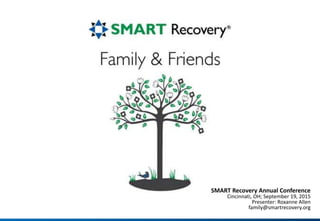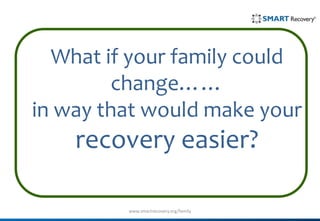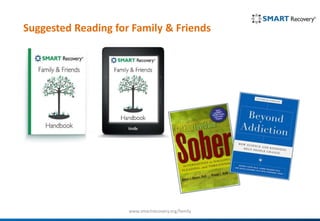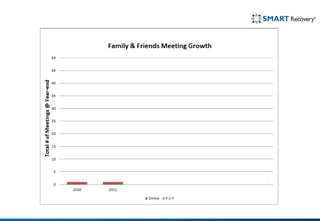2015 SMART Recovery Family & Friends Update
- 1. SMART Recovery Annual Conference Cincinnati, OH; September 19, 2015 Presenter: Roxanne Allen family@smartrecovery.org
- 3. www.smartrecovery.org/family What if your family could changeŌĆ”ŌĆ” in way that would make your recovery easier?
- 4. www.smartrecovery.org/family Illustration by Center for Motivation and Change
- 9. www.smartrecovery.org/family PROBLEMS . Things are really tense They just donŌĆÖt get it! Everyone is always mad at me I have NO privacy! Nobody trusts me anymore
- 10. www.smartrecovery.org/family PROBLEMS F & F SOLUTIONS Things are really tense COMMUNICATION SKILLS They just donŌĆÖt get it! ACCEPTANCE & UNDERSTANDING Everyone is always mad at me EMOTIONAL SELF-MANAGEMENT I have NO privacy! HEALTHY BOUNDARIES Nobody trusts me anymore TRUST BUILDING
- 14. CRAFT www.smartrecovery.org/family Illustration by Center for Motivation and Change
- 17. www.smartrecovery.org/family Face-to-Face: Recovery Meeting Facilitator Online: Family & Friends Meeting Helper Don Allen Innisfail, Alberta, CN
- 21. www.smartrecovery.org/family ’üČFamilies & Friends ’üČLessen emotional upsets ’üČManage their expectations ’üČRefocus on self, improve their lives ’üČChange interactions with Loved One ’üČRecovery Participants ’üČFamily provides meaningful support ’üČDe-escalate tensions in relationships ’üČImproved Communication ADVANTAGES
- 22. www.smartrecovery.org/family Suggested Reading for Family & Friends
- 24. www.smartrecovery.org/family More Resources for Family & Friends
- 30. CONTACT US: Find a Meeting Start a Meeting Ask a Question www.smartrecovery.org/family
Editor's Notes
- #16: So. We worked to design a meeting format that would address both tracksŌĆ”emotional self-management using SMART tools and Supporting a Loved One using the communication and boundary skills described in GYLOS. ┬Ā For those of you who are unfamiliar with GYLOS it focuses on giving family members an alternative to the Tough Love, kick them to the curb approach to ŌĆ£helpingŌĆØ a Loved One that some other support groups advocate. We held our first meeting almost exactly two years ago. Since everyone in the group was new we started with what I would call a tool-centric meeting format and we have stuck with that. We have found that everyone benefits from this format. It helps all of us to keep the meetings solution-oriented and not problem-oriented (bad) and it helps keep the focus on the Family member, not the addicted Loved One. I am happy to share with you that our efforts have paid off in a big way. We have an active and supportive message board forum for Family & Friends. The attendance at our weekly meeting has grown and is now in the range of 25-30 and, our members are asking us to start a second online meeting. ┬Ā I started out by saying Family & Friends is a big area with a lot of potential for new meetings - and for expanded recognition for SMART. How much potential? Well, Since weŌĆÖre evidenced ŌĆōbased here, letŌĆÖs take a look at our data. ┬Ā The size of our Message Board and the size of our weekly online meeting are just the tip of the Family & Friends iceberg. To get an idea of the real interest level out there, we need to look at the internet traffic on our website. ┬Ā With close to 4000 visitors per month, the Family & Friends information page is the second most frequently visited page on our site. It is second only to the main page.: ┬Ā But, I think perhaps the best indication that there are a large number of Family & Friends who are coming to SMART serious about finding help would be to look at the book sales through our Amazon gateway. They look something like this:
- #28: This is a very popular book and itŌĆÖs just one of the many resources we use in our meetings. Our meetings focus on the Family and Friends member. We focus on their emotional - and self-control challenges. We help them find an effective middle ground for interacting with their Loved One in a calm and helpful way. a middle ground between the tough-love approach and the -nagging-pleading and threatening approach. We help the person think RATIONALLY about them selves, and about their choicesŌĆ”. as they develop healthy boundaries and positive communication --- and as they develop problem solving strategies for themselves - using the SMART tools. In this way they create a family environment that is healthy for them -- first and foremost.┬Ā-- And healthier for their loved one -- at the same time. ┬Ā And now for the real excitement:
- #29: This is a very popular book and itŌĆÖs just one of the many resources we use in our meetings. Our meetings focus on the Family and Friends member. We focus on their emotional - and self-control challenges. We help them find an effective middle ground for interacting with their Loved One in a calm and helpful way. a middle ground between the tough-love approach and the -nagging-pleading and threatening approach. We help the person think RATIONALLY about them selves, and about their choicesŌĆ”. as they develop healthy boundaries and positive communication --- and as they develop problem solving strategies for themselves - using the SMART tools. In this way they create a family environment that is healthy for them -- first and foremost.┬Ā-- And healthier for their loved one -- at the same time. ┬Ā And now for the real excitement:
- #30: This is a very popular book and itŌĆÖs just one of the many resources we use in our meetings. Our meetings focus on the Family and Friends member. We focus on their emotional - and self-control challenges. We help them find an effective middle ground for interacting with their Loved One in a calm and helpful way. a middle ground between the tough-love approach and the -nagging-pleading and threatening approach. We help the person think RATIONALLY about them selves, and about their choicesŌĆ”. as they develop healthy boundaries and positive communication --- and as they develop problem solving strategies for themselves - using the SMART tools. In this way they create a family environment that is healthy for them -- first and foremost.┬Ā-- And healthier for their loved one -- at the same time. ┬Ā And now for the real excitement:





























